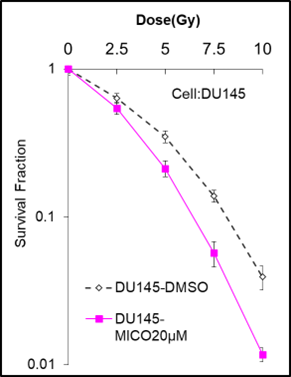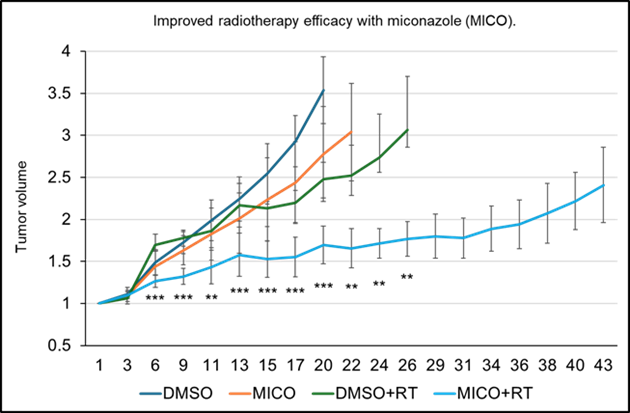Advantage and Core Benefit
- Enables repositioning of existing antifungal agents as radiation sensitizers
- Potential applicability to other cancer types exhibiting radio-resistance
Background and Technology
Radiotherapy is a standard treatment for localized prostate cancer. However, recurrence occurs in over 15% of intermediate-risk patients and in approximately half of high-risk patients after treatment, highlighting the unmet need for effective radiation sensitizers.
The inventors focused on molecular mechanisms regulating radiosensitivity in prostate cancer. Through CRISPR-based genetic screening, DCLRE1C (Artemis) was identified as a critical gene conferring radio-resistance. Artemis is a key component of the non-homologous end joining (NHEJ) pathway, which repairs DNA double-strand breaks (DSBs) caused by radiation. Prostate cancer cell lines deficient in Artemis exhibited enhanced DNA damage and increased radio-sensitivity.
AI-assisted compound screening identified miconazole—an azole antifungal agent—as a specific binder to Artemis. Miconazole treatment significantly enhanced the radiosensitivity of prostate cancer cells. Given its established clinical use as an antifungal drug, miconazole holds strong potential for repositioning as a radiation sensitizer. Its application may contribute to reduced recurrence and lower medical costs in prostate cancer treatment.
Data
- Miconazole (10-20 µM) increased radiosensitivity in DU145, LNCaP, and 22RV1 prostate cancer cell lines, accompanied by a reduction in Artemis protein expression.
- Enhancement of radiation therapy (RT) efficacy by miconazole (MICO) administration: Tumor volume progression and survival rate were evaluated in four groups—DMSO control group, miconazole monotherapy group (MICO), radiation monotherapy group (DMSO + RT), and combination therapy group (MICO + RT). The combination group (MICO + RT) showed significantly greater tumor suppression and improved survival compared to the RT-only group.
 |
 |
Patent & Publication
Patent: Application filed (unpublished)
Researcher
Dr. Toshiki Oka and Dr. Koji Hatano (University of Osaka)
Expectations
Joint Development of Radiation Sensitizers Based on Azole Compounds: We propose collaborative development of novel radiation sensitizers based on azole compounds. By combining your expertise in chemical synthesis and drug development with our academic insights into radiotherapy, we aim to bring this new treatment strategy to clinical application.
Drug Provision for Efficacy Evaluation at the University: By providing your proprietary compounds, our university team can evaluate their radio-sensitizing effects and therapeutic potential in combination with radiotherapy. This will allow for rapid and cost-effective efficacy validation of your drug candidates.
Collaborative Screening and Development of Artemis-Targeting Agents: We propose collaborative research to screen and develop new compounds targeting Artemis, leveraging our fundamental research and biological assays.
Project ID:WL-04945


